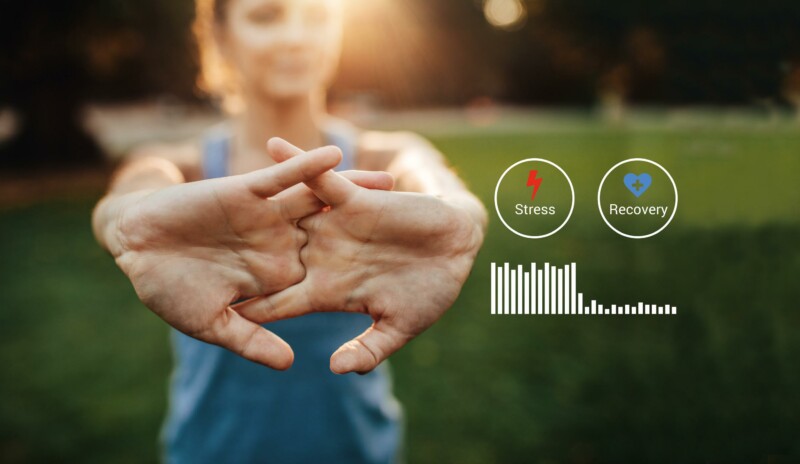
Key points:
- Study utilizes over 18,000 monitored days in the United Kingdom from real-world conditions
- Heart rate variability (HRV) offers objective insights into periods of stress and recovery
- Monday is the least stressful ‘work day’
- November is the most stressful month of the year
- August is the best month of the year for recovery
What is the most stressful day of the week? Are people more stressed in the summer or in the winter? And, what impact does alcohol have on stress and recovery? These are some of the questions answered in the Firstbeat Research Database.
Stress is a complex and growing epidemic in the UK. A 2018 study by the Mental Health Foundation found that 74% of UK adults were so stressed at some point during the year that they felt “overwhelmed or unable to cope”. However, when balanced with effective recovery, being in a physiologically stressed state for a short time can actually help focus attention and boost productivity.
The Firstbeat Research Database includes over 18,000 days of data collected in the UK between March 2017 and March 2019. These results show when stress peaks and troughs, as well as uncovering which days and months see the most recovery take place. Monday can claim the crown of the least stressful day of the ‘working week’ (Mon-Fri) but it is a tight run race for the unwanted title of the most stressful day. Meanwhile, August ranks as the least stressful month of the year – a result teachers would probably agree with!
Using Heart Rate Variability to monitor stress
Firstbeat monitors stress levels and periods of recovery in individuals by tracking heart rate variability (HRV) – the time between heartbeats – to identify activity occurring within the autonomic nervous system (ANS). The ANS controls our bodily functions and plays a key role in regulating cardiovascular activity. It includes the sympathetic (“fight or flight”) and parasympathetic (“rest and digest”) nervous systems. Interpreting which is the dominant system at any one time by tracking HRV shows the levels of stress and recovery reactions in the body. Stress can be identified by decreased HRV, whilst increased HRV is emblematic of recovery.
I don’t like Mondays
According to Firstbeat’s database, the least stressful day of the traditional working week in the UK is Monday, when just over 50% of the day is spent in a stressed state. That’s compared to over 54% for the four days that follow. That’s welcome news for those people who experience #SundayNightFear on the eve of a new working week! Especially when you add in that Monday sees more time in a state of recovery (28%) than any other day of the week, including weekends.

Table 1 shows the proportion of stress in a UK day. Table 2 shows the proportion of recovery in a UK day. A single day’s data is classed as from approximately 10:00am until 10:00am the following morning.
When the sun shines
Summer really is a recipe for relaxation according to the data as August days see the smallest proportion of stress and the highest proportion of recovery. Maybe this has something to do with the fact this is traditionally the month most of us go on holiday and enjoy some down time. Meanwhile, October, November and December are among the most stressful months of the year and take gold, silver and bronze when it comes to least recovery. This could be down to chasing end of year deadlines at work or burning the candle at both ends during the festive season?
Interestingly, there is a correlation between drinking alcohol and increased stress. Across the board, from January through to December, the data showed people spent a reduced amount of their day in a ‘stressed state’ when those days did not include alcohol consumption and recovered far worse when alcohol was involved. At times the difference was more than 2%. Previous Firstbeat research has shown the effect of alcohol on recovery.

The left graph shows the average stress percentages in monitored individuals during different months of the year, taking into account alcohol consumption. The right graph shows the average recovery percentages during different months of the year.
“When considering these findings, it is important to note that not all stress is ‘bad’,” explains Firstbeat Exercise Physiologist, Tiina Hoffman. “Stress is a physiological response to a situation and also works in a positive way to help you focus and complete tasks. It’s not possible, or even meaningful, to completely eliminate periods of stress. The important thing is to find the appropriate balance for an individual between stress and recovery.”
About the Firstbeat Research Database
Data used in the study came from the Firstbeat research database. Each of these individuals participated in the Firstbeat Lifestyle Assessment, which typically utilizes a 72-hr recording of HRV data along with other tools to explore the relationship between stress, recovery, physical activity and well-being. HRV data was recorded using the Firstbeat’s Bodyguard 2 professional-grade HRV recording device in real-world conditions of daily life.
The Firstbeat research database is used to investigate topics of sleep, stress, recovery, and physical activity. As of 2019, the global database has grown to include over 350,000 days of assessment data from approximately 120,000 individuals.
About Firstbeat
Firstbeat is the leading provider of advanced performance analytics for sports, fitness and well-being. Firstbeat technology transforms heartbeat data into personalized and actionable information on stress, recovery, sleep and exercise. Firstbeat’s physiological analytics are used by over one thousand elite sports teams, thousands of corporations, and millions of consumers worldwide to improve performance and well-being. Firstbeat’s revolutionary analytics technology has created a digital model of users’ physiology through advanced modelling of heart function and heart rate variability (HRV).
If you liked this article, you should subscribe to our mailing list
You might also be interested in

Rest Is Not the Same as Recovery – And 4 Other Surprising Things I’ve Learned About Resilience
What Firstbeat’s Heart Rate Variability analytics can tell you about resilience.

4 Simple Ways to Reduce Stress
You don’t always need long mindfulness exercises or a yoga retreat to relieve stress. Discover 4 easy things you can do to help defuse your lifestyle.

